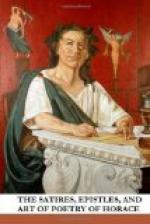at all, and if he is a dexterous writer, like Pope
or Johnson, he is sure to be able to introduce a number
of small equivalents, some of them perhaps actual
improvements on the original, while he is at liberty
to throw into the shade those points of which he despairs
of being able to make anything. A translator
has three courses open to him, to translate more or
less verbally, so as to run the risk of being unintelligible
to a reader unacquainted with the original, to generalize
what is special, and to borrow something of the imitator’s
licence, introducing a modern speciality in place of
an ancient. Here, as I have found on other occasions
of the kind, to be allowed a choice of evils is itself
a matter for self-congratulation. To be shut
up entirely to one or other of these resources would
be a serious misfortune: to be able to employ
them (should it seem advisable) successively is no
inconsiderable relief. The last of the three
no doubt requires to be used very sparingly indeed,
or one great object of translating a classic, the laying
open of ancient life and thought to a modern reader,
will be wantonly sacrificed. No one now-a-days
would dream of going as far in this direction as Dryden
and some of the translators of his period, talking
e.g. about “the new Lord Mayor” and
“the Louvre of the sky.” But there
are occasionally minor points—very minor
ones, I admit—where a modern equivalent
is allowable, if not absolutely necessary. Without
transforming bodily a Roman caena into an English
dinner, one may sometimes effect with advantage a trifling
change in the less important dishes: a boar must
not appear as a baron of beef, but a scarus may perhaps
be turned, as I have turned it, into a sardine.
In money again it would surely be needless pedantry
in the translator of a satirist to talk of sestertia
rather than pounds. I fear I have not always
been at the pains to make the English sum even roughly
equivalent to the Roman, but have from time to time
introduced a particular English sum arbitrarily, if
it appeared to suit the context or even the metre.
Thus, where Philip gives or lends Mena fourteen sestertia
that he may buy a farm, I have not startled the modern
agricultural reader by talking about a hundred and
twenty pounds, but have ventured to turn the sestertia
into so many hundreds. On the whole, however,
while I certainly cannot recommend any one to try
to distil Latin antiquities from my translation as
they are sometimes distilled from the original, I
hope that I have not been unfaithful to the antique
spirit, but have reflected with sufficient accuracy
the broad features of Roman life.




